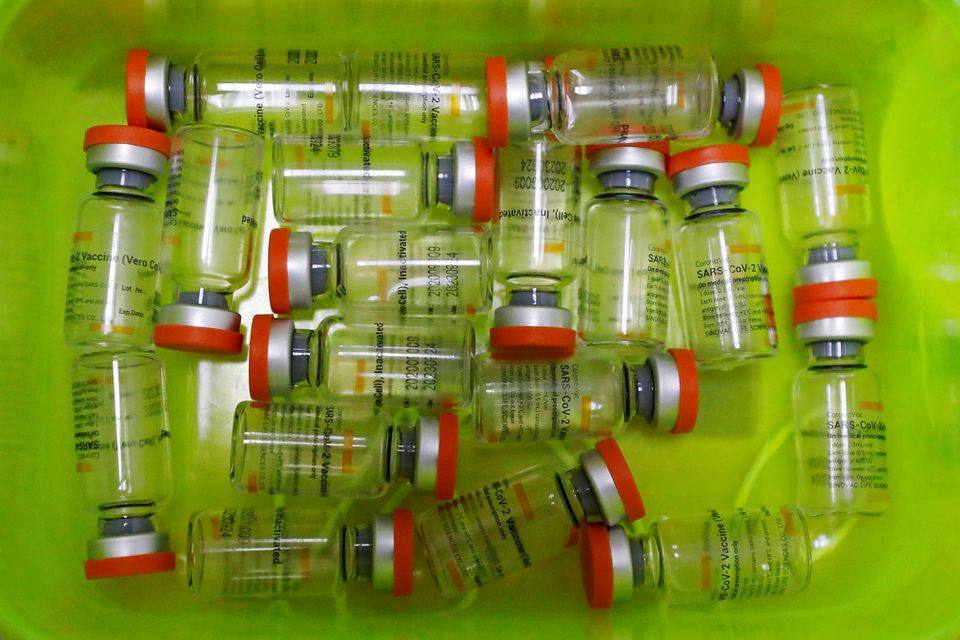Antibodies fade
BEIJING, July 27 (Reuters) - (This story from July 27 corrects paragraph 3 to show that antibodies below the threshold are low or undetectable, not just undetectable)
Antibodies activated by Sinovac Biotech's COVID-19 vaccine (SVA.O) fell below a key threshold of around six months after a second dose for most recipients, but a third injection had a strong effect of reinforcement, a laboratory study showed.
Chinese researchers reported the findings of a study of blood samples from healthy adults ages 18 to 59 in an article published Sunday, which has not been peer-reviewed. https://bit.ly/3zGsxQt
Among participants who received two doses, two or four weeks apart, only 16.9% and 35.2% respectively still had neutralizing antibodies above a threshold set by the researchers, below which the level of Antibodies are considered low, or undetectable, six months after the second injection, the paper said.
Those readings were based on data from two cohorts with more than 50 participants each, while the study administered third doses of the vaccine or placebo to a total of 540 participants.

The researchers said it was unclear how lowering antibodies would affect the effectiveness of the injection, as scientists have yet to precisely determine the threshold of antibody levels for a vaccine to prevent disease.
In addition to long-lasting antibodies, other components of the human immune system, such as T cells and memory B cells triggered by the vaccine, may also contribute to protection, the researchers involved in the study said, although the study did not provide data on those factors.
"In the short to medium term, ensuring that more people complete the current two-dose CoronaVac (Sinovac vaccine) program should be the priority," the document said.
Participants in some cohorts who received a third dose of Sinovac injection about six months after the second showed about a 3-5-fold increase in antibody levels after another 28 days, compared to levels seen four weeks after the second injection.
As of the end of June, Sinovac has delivered more than 1 billion doses of the vaccine, an important vaccination tool in China, Brazil, Indonesia and Chile.
Other COVID-19 vaccine manufacturers are seeking authorization for booster vaccines. Pfizer (PFE.N) and its partner BioNTech (22UAy.DE) said earlier this month that they had planned to ask regulators in the US and Europe in the coming weeks to authorize a booster dose of their COVID-vaccine. 19, based on evidence of an increased risk of infection. months after inoculation and spread of the highly contagious Delta variant. read more
Siti Nadia Tarmizi, a senior health ministry official in Indonesia, told Reuters on Tuesday that clinical data from the country showed that the reduced level of antibodies is still sufficient to provide protection, without providing details. read more
She said the immunization advisory board recommends a booster shot 12 months after the second dose.
Indonesia has started giving Moderna-produced booster injections (MRNA.O) to medical workers this month, including those who had received doses of Sinovac.
Philippine Health Secretary Francisco Duque said Tuesday that there is still no recommendation from the country's panel of vaccine experts on administering a booster shot, but experts are discussing the possibility.
Turkey has already started offering a third dose of Sinovac or Pfizer to some people who have received Sinovac injections.
The Sinovac vaccine research article said the study did not test the effect of antibodies against more transmissible variants and that more research was needed to assess the duration of the antibodies after a third injection.
The study was conducted by researchers from the disease control authorities in Jiangsu Province, Sinovac and other Chinese institutions.
Reporting by Roxanne Liu and Ryan Woo in Beijing, Neil Jerome Morales in Manila, Stanley Widianto in Jakarta. Editing by Mark Potter, Miyoung Kim, Raju Gopalakrishnan and Jane Merriman